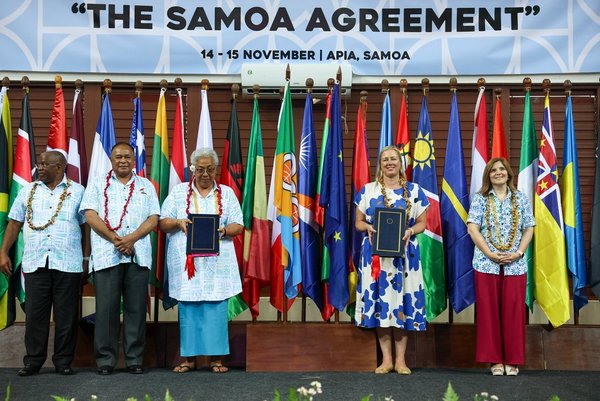 Read this article in French
Read this article in French- Share this article
- Subscribe to our newsletter
The Samoa Agreement – a new foundation for partnership
On the 15th November 2023, the European Union (EU) and its Member States signed a new Partnership Agreement with the Members of the African, Caribbean and Pacific States (OACPS) that will serve as an overarching legal framework for their relations for the next twenty years. The 27 EU Member States and the 79 African, Caribbean and Pacific countries together represent around 2 billion people and more than half of the seats at the United Nations.
This agreement succeeds the Cotonou Agreement, which was signed in 2000, and will be known as the “Samoa Agreement”. The Partnership Agreement covers subjects such as sustainable development and growth, human rights and peace and security.
The post-Cotonou negotiations started in September 2018, in the margins of the United Nations General Assembly in New York/USA. In April 2021, the chief negotiators initialled the new Agreement. A decision on its signature and provisional application was adopted on the 20th July 2023.
The new Partnership Agreement lays down common principles and covers the following priority areas:
- human rights, democracy and governance
- peace and security
- human and social development
- inclusive, sustainable economic growth and development
- environmental sustainability and climate change
- migration and mobility
“This agreement is a landmark for the EU’s external relations. The Samoa agreement brings together more than half of the UN members, from four continents, around shared priorities and interests. We are definitely moving away from the old paradigms and instruments that linked the EU to most of those countries into win-win partnerships that are fit for the current world. At a moment in time where multilateralism is in danger, the fact so many countries can come together and agree on joining forces to face global challenges opens a door for optimism,” says High Representative of the Union for Foreign Affairs and Security Policy Josep Borrell.
The agreement includes a common foundation, which applies to all Parties, combined with three regional protocols for Africa, the Caribbean and the Pacific with a focus on the specific needs of each region. Its provisional application will start on the 1st January 2024.
The Agreement enters into force upon consent by the European Parliament and ratification by the Parties, i.e. all EU Member States and at least two thirds of the OACPS Members.
(European Commission/ile)
More information:





Add a comment
Comments :